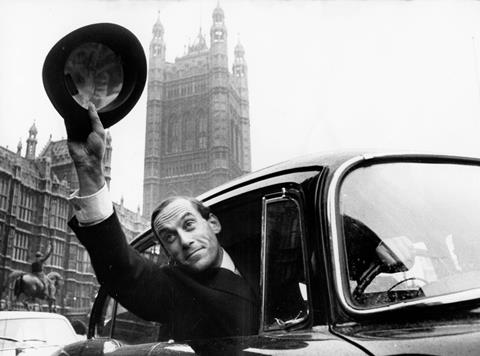Kingsley Napley’s Linda Woolley, who is retiring after 21 years as managing partner, tells Eduardo Reyes that kindness and commerciality go hand in hand

Linda Woolley has decided what she won’t be doing in retirement. ‘I don’t want to be a trustee of anything. I don’t want to be non-exec director,’ she tells me. She is talking after a remarkable run as managing partner of London law firm Kingsley Napley – 21 years, the first three as joint managing partner with two colleagues.
Firm income is up 150% since Woolley took sole charge in 2007; the firm’s headcount is more than 400 and since 2021 it has occupied 55,000 square feet of handsome purpose-built offices which could pass for the home of one of law’s global elite.
Unlike many corporate behemoths, however, Kingsley Napley has appeared in The Sunday Times’ coveted ‘100 Best Companies To Work For’ for 12 years on the trot. Woolley’s record would make her a shoo-in for any number of non-executive roles, but she has other ideas.
Recently, the James Graham true-story play Punch made an impression. In particular its account of restorative justice, involving a man who killed a trainee paramedic on a night out with a single punch. Its portrayal of the ‘transformative’ potential of restorative justice hit home, and, as a criminal defence lawyer until 2012, Woolley says finding a voluntary role supporting restorative justice projects strongly appeals. ‘That’s the only thing I’m interested in doing voluntarily,’ she says.
This interview, then, is not a pitch for future roles. Instead, she is keen to pass on her reflections on occupying a position of leadership in the law and to talk about the values that should inform a profession in which ‘we are paid, in my view, incredibly well for what we do’.
Beginnings
Appointing three managing partners might sound like the decision of a senior partner anxious to divide and rule – playing off the managing partner triumvirate against each other. Instead, Woolley says, they worked as the firm’s executive, covering the period when the running of the firm became more professional. ‘Before,’ she recalls, ‘the firm hadn’t really been actively managed.’
That was not unusual for a firm of its size, Woolley observes. But it could not continue if the firm was to avoid ‘a second-generation crisis’, as it transitioned from a practice defined by the work of its high-profile founding partners and famous clients, such as the former Liberal party leader Jeremy Thorpe. (Thorpe’s acquittal in 1979 on charges of conspiracy to murder was an immediate business development gain for David Napley and barrister George Carmen’s practices. Napley has a large conference room named for him at the Law Society.)
To take the reins as sole managing partner, Woolley realised she needed more than her years of successful practice and the trust shown by colleagues in appointing her. She signed up for a ‘mini-MBA’ course at Harvard Business School and insisted on taking a colleague, the director of marketing. ‘I took someone with me because I thought we’d have more chance then of following up what we’d learnt.’

The delivery of the course was a disappointment. ‘I thought we would be given all this homework,’ she recalls, ‘given case studies and that it would be in small seminar rooms.’ Instead, content was delivered through lectures in a large, packed auditorium. ‘I don’t really thrive in a great big room like that.’
But she was listening closely and key points resonated with what she might try to achieve with Kingsley Napley. Woolley recalls the advice that ‘not making a decision is a decision in itself. Be decisive, try to make good decisions – but being decisive is more important.
‘That really resonated with me because, at that time, Kingsley Napley did not really make decisions,’ she adds.
Another point concerned ‘values’. In her working environment, there was no express focus on values, she notes: ‘In those days, “values” weren’t really a thing.’
The importance of strategic ‘alignment’ was a third lesson. This was defined by the Harvard Business Review as meaning that ‘all elements of a business – including the market strategy and the way the company itself is organised – are arranged in such a way as to best support the fulfilment of its long-term purpose’.
A fourth related to the importance of having ‘a strong mandate’ for the things you want to achieve, and to realise that you are at your strongest when you are taking up a post. Therefore, ‘if there’s something that’s really important to you, then say so now’. Accordingly, she says: ‘I wrote myself a mandate and discussed it at a partner lunch.’
She also insisted on having the support of an executive coach.

Leading in law
I ask about the differences between being a leading lawyer and being a leader in law. It strikes me that, in going to Harvard for a course and then using an executive coach, the assistance Woolley knew she needed helped to frame and structure her thoughts and aims.
‘You’re right,’ she answers. ‘It gave me a framework to progress the things that I had in my mandate. And it gave me, therefore, a base of confidence around achieving those things and how to achieve them.’ She was also glad to be in a network with other managing partners.
‘We’ve all got problems with IT, partner performance, evaluations, partner remuneration,’ she points out. She found fellow members to be collegiate in sharing their approach and experience to such common problems. ‘I’ve now got my own network that I’ve collected from different networks,’ she says.
'The attributes of many excellent lawyers are antithetical to being a good leader or manager because, often, it’s about criticism, analysis'
We reflect on the fact that the skills and behaviours that make a lawyer successful do not necessarily transfer to leadership. Nevertheless, she says: ‘I can now understand why law firms are managed by other lawyers. I’m not sure it’s about the actual skills we have, but it’s partly that lawyer arrogance, which is that no one can understand them if they’re not a lawyer.
‘To be honest, the attributes of many excellent lawyers are antithetical to being a good leader or manager because, often, it’s about criticism, analysis. I was a criminal defence lawyer. What we mainly do is break things down… which can be unhelpful.’
The course at Harvard, Woolley notes, stressed a balance of ‘people, clients, money’. In a profession such as law, she now believes, ‘you can’t say they’re all equally important: one has to go first, and to me, it would always be people’. Not least, she adds: ‘You don’t make good decisions unless you consult.’ And being willing to listen, Woolley says. She has had the same PA since 1994, who in the days of individual offices – before the move to Bonhill Street, near the City’s Finsbury Square – would joke that a bench was needed outside Woolley’s room for the many colleagues waiting to see her.
A plan
Kingsley Napley did not have a ‘business plan’ until 2005. When the three-strong executive sat down to write one, there was an overriding priority. ‘Every time someone was off sick, it was a mini-crisis,’ she recalls. Each team needed ‘critical mass’. Achieving that, she recounts, was one of her biggest initial accomplishments.
How do you attract good people who will secure your reputation in a practice area where you are underpowered? There are countless meetings with lawyers who decide not to join. Then, you hope that something in the culture and values of what you are offering tempts them.
‘We’ve always worked to our strengths,’ Woolley continues. The approach taken was to try and grow ‘adjacencies… So, where we would always have been doing financial services work in the criminal team, we would now have a team of people doing financial services working in the criminal team. Criminal is where we used to do all of our regulatory work, but we now have a separate regulatory department’.
She recalls that the first mention of a Kingsley Napley property partner in the Chambers & Partners Legal Guide saw champagne opened. The real estate team is now firmly established.
Lessons from leadership
What Linda Woolley learnt during 21 years as managing partner of Kingsley Napley – a period in which the firm’s culture, size and profitability were transformed.
- A leader is at their most powerful on appointment. Set out your ‘mandate’ immediately.
- Not making a decision is also a decision.
- Get an executive coach.
- Strategic alignment is key: all elements of a business – including the marketing strategy and the way the firm is organised – should be arranged to support the fulfilment of its long-term purpose.
- Good decisions are not made without consultation.
- Internal communication is a priority.
- Grow using your strengths, which can include ‘adjacencies’.
- Treat all colleagues with respect.
- ‘Kindness’ can support commerciality – they are not in conflict.
- Women leaders are still viewed differently to men.
Kind and nice?
The firm’s initials – KN – could be a source of a particular tease down the years, as standing for ‘kind and nice’. In the past, it was not a compliment. But Woolley now says it is a strength for any firm that seeks to have a good workplace culture.
‘There’s worse things to be,’ she argues. ‘You obviously have to have a bit of steel if you’re the managing partner, because to make a good culture you have to deal with people who are not behaving in a way that’s consistent with it.’
She always stresses the importance of a respectful culture to lateral hires: ‘I do always say to people in partner interviews that we are a hierarchy – all businesses have to be a hierarchy – but we do our best not to be. And if you sat in our reception for a while, I hope you wouldn’t be able to work out who’s the receptionist, and who’s the managing partner, because that shouldn’t decide how we relate to each other. We’ve each got an important role in the business, albeit a different one.’
She has had reason to refer back to such introductory conversations when tackling a lateral hire’s attitude at a later date. Where they have fallen short of the standards of respect that were set out, she’s been able to say to them, ‘come on, you know!’.
It is not, Woolley argues, an approach that is to the detriment of commerciality: ‘It’s not commerciality or culture. A strong culture like we have enables us to be commercial and profitable.’
'I always say in partner interviews that we are a hierarchy – all businesses have to be a hierarchy – but we do our best not to be'
Woolley gives the example of a colleague who needs time off, perhaps because a close relative is dying, being allowed to take the time they need. In an era when a major cost to law firms is personnel churn, ‘kind’ treatment at a point of personal crisis builds loyalty. People you need are more likely to stay.
The challenge no law firm leader was expecting was the pandemic and its attendant lockdowns – and of course its real threat was the physical and mental health of its people. ‘The firm had never been communicating better than it did in the pandemic,’ Woolley recalls. It showed her the importance of internal communication, including from the top. She sent a daily message to colleagues. ‘I’d wake every morning thinking, “What am I going to talk about tonight?” [But] there was always something [to say].’ There were the almost obligatory online choir practices, a magician at the online AGM and many shared dog photos.
What hit home most, Woolley says, was honesty about the problems of managing work – something she also worried about. ‘One of the most popular things that I said – although I didn’t say it in quite these terms – was that most of us get up in the morning and the biggest worry is how we are going to get through all the work we’ve got to do today. And I have that worry, but it’s still important that we go out for a walk because otherwise we’ll just drive ourselves into the ground… And apparently, me saying I felt guilty and I sometimes had really unproductive days made people feel much better.’
We return to the point she appreciated early on in leading the firm – that you are at your strongest when you are appointed. It is important to set out your mandate.
‘As you’re further towards the end of your tenure, like Tony Blair, you become very competent but less powerful, less influential,’ she says.
As she looks at women in leadership positions, she still sees sexism in how they are perceived. ‘I do think a woman, a female leader who has the stereotypically female strengths of kindness and gentleness and those things, we’re more vulnerable to being accused of not being as commercial,’ Woolley reflects. ‘Whereas, if a male leader shows those strengths of compassion, say, it’s like, “Wow, not only is he a great business leader, we make loads of money and we’ve grown loads with him, he’s also a really nice guy”.’
Woolley is still supporting the ‘onboarding’ of her successor, Matt Meyer, who took up the new position on 1 April. But, she notes, every weekend is now a ‘long’ weekend. She has always been keen on the theatre and is looking forward to watching plays feeling ‘less tired’. She loves London, her home, and she and her husband have bought a motor home.
What is on her mind as she retires, looking back at a legal and management career spent at the same firm? ‘I would say, we have got a much better culture now than when I started and we have got a much greater reputation for good culture, so our employer brand is much stronger … that’s what I’m most proud of.’




































1 Reader's comment